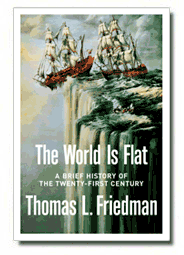The World Is Flat

Original 1st edition cover
|
|
| Author | Thomas Friedman |
|---|---|
| Country | United States |
| Language | English |
| Subject | Globalization |
| Publisher | Farrar, Straus and Giroux |
|
Publication date
|
April 5, 2005 |
| Media type | Print (Hardcover and Paperback) and audio-CD |
| Pages | 488 |
| ISBN | |
| OCLC | 57202171 |
| 330.90511 22 | |
| LC Class | HM846 .F74 2005 |
| Preceded by | Longitudes and Attitudes |
| Followed by | Hot, Flat, and Crowded |
The World Is Flat: A Brief History of the Twenty-first Century is an international best-selling book by Thomas L. Friedman that analyzes globalization, primarily in the early 21st century. The title is a metaphor for viewing the world as a level playing field in terms of commerce, wherein all competitors have an equal opportunity. As the first edition cover illustration indicates, the title also alludes to the perceptual shift required for countries, companies, and individuals to remain competitive in a global market in which historical and geographic divisions are becoming increasingly irrelevant.
Friedman himself is a strong advocate of those changes, calling himself a "free-trader" and a "compassionate flatist", and he criticizes societies that resist the changes. He emphasizes the inevitability of a rapid pace of change and the extent to which the emerging abilities of individuals and developing countries are creating many pressures on businesses and individuals in the United States; he has special advice for Americans and for the developing world (but says almost nothing about Europe). Friedman's is a popular work based on much personal research, travel, conversation, and reflection. In his characteristic style, through personal anecdotes and opinions, he combines in The World Is Flat a conceptual analysis accessible to a broad public. The book was first released in 2005, was later released as an "updated and expanded" edition in 2006, and was yet again released with additional updates in 2007 as "further updated and expanded: Release 3.0." The title was derived from a statement by Nandan Nilekani, former CEO of Infosys.The World Is Flat won the inaugural Financial Times and Goldman Sachs Business Book of the Year Award in 2005.
In his book The World Is Flat, Friedman recounts a journey to Bangalore, India, when he realized globalization has changed core economic concepts. In his opinion, that flattening is a product of the convergence of the personal computer with fiberoptic microcable with the rise of work flow software. Friedman termed the period Globalization 3.0, thereby differentiating it from the previous, Globalization 1.0, during which countries and governments were the main protagonists, and Globalization 2.0, during which multinational companies led the way in driving global integration.
...
Wikipedia
